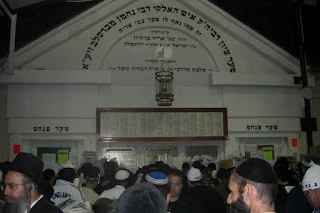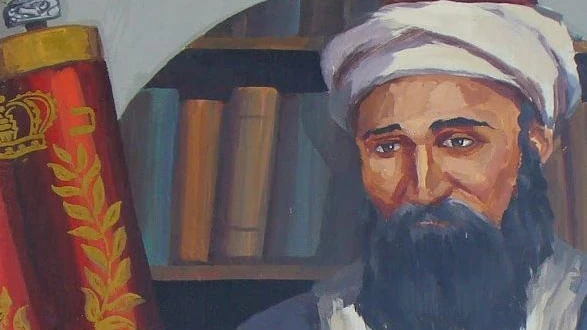המשגיחים
God's Neighbours (2012)

Imagine that the chairman of your Neighbourhood Watch is a DJ and mixtape composer with an interest in Tibetan mysticism, who smokes weed and carries a baseball bat around the hood.
That’s a very rough analogy of the scenario here. The setting of the tale is Bat Yam, a small city to the south of Tel Aviv, part of the Greater Tel Aviv metropolis. It’s not the kind of place that you’d be likely to visit on a trip to Israel, unless you have a family connection or some kind of professional sociological/anthropological interest.
In characterisations of Israel which break it down into something more complex and less monolithic than the Zionist Entity, Tel Aviv and Jerusalem are contrasted thus: the former is the hedonistic secular party town perpetually engaged in a culture war with the buttoned up Holy City, which is closed on Saturdays (aka SHABBES). However, given that the Greater Tel Aviv conurbation is home to approximately half of the Jewish half of the population between the River and the Sea, it stands to reason that there’s plenty of scope for diversity there.
Bat Yam is one part of the Tel Aviv metropolis which contradicts the lazy generalisation. Over the several generations since the founding of the State of Israel, it has become home to less affluent members from each wave of immigration to the country, starting with the Sephardi, Mizrahi and Yemeni communities which arrived as a result of the mass expulsions of Jews from Arab and other Muslim countries in the wake of Israel’s founding in 1948. Given the geographic range of places that they came from, the story of these communities is of course a very complex one, but in a very unsophisticated nutshell the story can be summarised like this: upon arriving in Israel in the months and years immediately after May 1948, these communities found themselves the object of discrimination by what subsequently came to be known as the Ashkenazi elite (read here if you don’t know what “Ashkenazi” means). This preceding generation of predominantly East European Labour Zionists, many of them aggressively secular and profoundly anti-religious, found the more conservative attitudes of the Middle Eastern Jewish communities to be antithetical to the vision of the country that they wanted to establish. This culture clash is now commonly characterised by those learned in the field (see here!) as a struggle between First Israel and Second Israel. 1977 was a pivotal moment in that struggle - being the year in which Likud, then the unchallenged hegemonic party of the Israeli right, wrested power from the Labour party. Menachem Begin became Prime Minister, after a generation in the political wilderness and set in train the ideological (as opposed to tactical) occupation of the territories conquered ten years earlier, hence creating the world that we live in today.
How did he get there, having represented the minority, that is to say the losing side of the pre-independence culture wars? Answer: by synthesising the hubris of the post-1967 colonialising movement with the resentment of Middle Eastern Jews, carefully channelled ***simultaneously *** against the Ashkanazi elite who had treated them as second class citizens and against the Arabs who had expelled these communities from their homes in Iraq, Syria, Egypt, Morocco and so on. Of course we have to comment here that it wasn’t the *Palestinian *Arabs who had expelled them from their homes, but the populist right never acknowledges such subtle distinctions.
The strategy worked, and it’s still working today. Look at the MIT-educated guy from the Ashkenazi elite who’s still Prime Minister of Israel at the time of writing 😏 (God forbid that anyone reading this in two or three years’ time is still seeing the face of Bibi Netanyahu anywhere other than in a jail cell). How is he still there? By inciting the mob (I’ll get to that in a later post!) and by cultivating Second Israel, by harnessing the same complexes and resentments that have ended up granting a cabinet seat to the monstrous Jewish fascist Itamar Ben-Gvir (who is himself of Iraqi Jewish descent, by the way🧐).
In the opening five minutes of this movie we see, in microcosm, the conflict between this community, here represented by the lead character (Avi) and his friends, with a more recent wave of migrants - the Russians, many of whom of course lost any connection with Jewish religious traditions during seventy years of state-sponsored Soviet atheism. It’s a scene which does not portend great things from Avi and his crew, but it’s worth the effort of hanging in there, because we are going to see a different side of Avi, especially once the love story begins.
To see the better side of Avi, there’s one more complication that you need to understand before you watch this movie (assuming that you really want to understand, of course!). Avi is of Turkish (meaning, presumably, Sephardi) descent, but he and the friends in his gang are in thrall to a mystically inclined branch of Hasidic Judaism inspired by Rabbi Nachman of Breslov, who was active at the turn of the eighteenth and nineteenth centuries in what is now Ukraine (in the image below you see the synagogue in which he was buried). What distinguishes the Breslovers from other branches of Orthodox Judaism is their emphasis on:
serving God through the sincerity of the heart, with much joy and living life as intensely as possible.
And you can read more about that here.

Along with this emphasis on taking joy in moments, there is a love of music and dancing which is frowned upon by more austere communities. The Breslovers are also a lot less sniffy than other East European Orthodox communities about outreach among other communities, including those not originally from Nachman’s Eastern European heartlands. All of which makes them an attractive proposition for Avi, who seems to be looking for a strong sense of identity, balanced with the freedom to allow his creative side to flourish.
Now….. a knotty question may come up here, to which I don’t have an adequate answer, but I’ll throw it out there in any case - if the Breslovers are “cooler” than the average Haredim and Hasidim, does that mean that they’re more likely to be on the left of the political spectrum and in favour of peace-making? I suspect that the answer to that question is as complex as the answer to any other apparently simple question about Israel and the Middle East in general, and I’m certainly not in any position to answer it myself. I would say that the film alludes to that question without coming to any firm conclusion.
I’ve more or less said everything that I needed to in order to prep the viewer, without saying anything at all about the girl in the love story. That is partly because the majority of the film’s focus is on Avi, and she doesn’t really become central to the drama right up until the end. This is absolutely not because she’s not important to the story, but really just because the drama is all about masculinity (much of it toxic, of course), and it’s about what happens to and changes in Avi. And look, if I say much more than that it’s just going to be a big spoiler. The girl’s name is Miri, and watch the film to find out more!
This is my second film post, being written in parallel with my post about Habibi. I am very (can I say “painfully”?) conscious that I’ve written quite a lot more here, but that’s just because I know and understand more of the background in this case. If I knew anything at all about 7th century Arabic poetry, and about other aspects of the social background in Gaza, I would have written more on that post. By contrast, I do know a fair amount about the background to this story, and not being enslaved to any word count I let it all out.
There is one crucial difference between this story and Habibi. If I talk about that here, it’s a MASSIVE spoiler, so I won’t. But it’s something that can and probably should be mentioned in the comments.

A couple of weeks after apparently finishing, there’s an afterthought, or addendum. The English translation of the Hebrew title is not at all literal, but I’ve been thinking about it, and I think that they’ve done something clever there. A bit of Hebrew language geekery coming up. Strap in for this. Starting with the Hebrew title of the film - haMashgikhim המשגיחים This roughly translates as “The Watchers” (or the “Gazers”), but there seems to be a nuance of divine providence in the word, that these people are watching over the community on God’s behalf. It’s not a word which occurs very commonly in the Hebrew Bible, and maybe it’s only the fact that it’s not an everyday word which lends it that poetic flavour. There is one Biblical example of its usage, and the book that we find it in is not insignificant - I’m sure - because it’s the Song of Songs, which is considered by more radical, feminist-inclined scholars to be the most likely candidate (if any exists) for a book in the Old Testament that might have been written by a woman, or at least let’s say written in a female voice. This is of course heresy to the Orthodox, who see the Song of Songs as a poem about God’s love for the People and Land of Israel (and then the Catholic Church decided that it was God’s love for the church - the things these guys make up, honestly!!!). The radical theory seems very plausible indeed to me

My beloved is like a gazelle or a young hart; behold, he standeth behind our wall, he looketh in through the windows, he peereth through the lattice.
All of that is of course going to be a bit difficult to get across in a snappy English title (suggestions below if you have any ideas!) so the translators have sidestepped, and gone for a different angle on what Avi and his mates are all about. And in so doing they’ve added something. The Hebrew words for neighbour - shakhen שכן - and neighbourhood - shekhuna שכונה - share a common root with the word for the divine presence - shekhina שכינה. Makes sense right? You’re going to feel a special tingle when God is nearby, in the hood. This shekhina might for example fall upon a congregation during an intense period of prayer, but of course for the Breslovers music is an essential element in what brings people together in the divine presence. So that ties up nicely with Avi’s musical interests. Furthermore, the Shekhina is also interpreted by less austere (and no doubt less male dominated) schools of Judaism as the emanation of God’s feminine energy. The word itself doesn’t go back to the Bible itself, and only came into use in the early rabbinical period, but the great scholar Rafael Patai suggests that the Shekhina is in fact a means by which the memories or echoes of pre-monotheistic goddesses, such as Asherah were integrated (or we might even say smuggled) into Rabbinical Judaism. Like everything else in Judaism and Jewish studies, this is of course fiercely debated and I’m certainly not here to give an opinion on that, because I’m no expert. I’m only going to say that it fits in nicely with the way that the toxic masculine energy of Avi and his gang comes into contact and conflict with the feminine energy represented by Miri. And………. NO SPOILERS.
This YouTube window contains a track from an album that I actually own myself. This is by a band called Sheva, who don’t appear to be active any more. This link takes you to a page about the lead singer. Sheva was a mixed Jewish and Arab band. Maybe a little bit too hippyish for my taste, but anyway they had the right idea about bringing everyone together through music. The track here is of course called “Shekhina”. Why else would I have mentioned them? It’s not the best track on the album as far as I remember, but you can decide for yourself, if interested.

And here’s another very pious-looking dude singing about the Shekhina. I have to provide the Spotify link for the song, as it seems the video won’t embed outside YouTube. Just click/tap on the pic if interested. I don’t think that this guy is especially famous in Israel, and I don’t even think that the song is good at all, but I’ve posted it because he looks like he could very easily be a Breslover. There is also the possibility that he could be a settler. In one of his videos that I looked at he was dancing around in some territories that might be occupied ones, but also might not be. I can’t find any information that tells me about his politics. There’s a settlement to the south of Jerusalem called Bat Ayin which is apparently a magnet for hippy-type religious guys who look a look like him, but honestly I can’t say from that video (judge for yourself) if those are legally or illegally settled lands. And that’s what I was saying about the Breslovers earlier in the piece - that there might be a 50/50 split among them (or 70/30, or 40/60 - again not my expertise to say which religious communities in Israel are more or less right wing, but of course the religious tend more to the right than the secular). There’s a scene in the movie where the rabbi tells Avi that he needs to choose between war and peace, and since that moment is shown in the trailer I guess I’m officially not giving away any spoilers there.
Very possibly you’d want to clear your ears out of the noise after listening to that last track, so go ahead and check this out (Belz, not Breslav, but the same vibe)., or even listen to a bit of this or indeed this, from north of the border. Time to move on to another post, but before I do that I just want to say once again that I’m sorry, especially on a day when it was reported that people in Gaza are now eating GRASS to survive, that I’m not able to bring the same amount of insight to Habibi as I could with this film. I’m sure that there are so many important poetic references in the film, and that I could have written just as much as I have here, and maybe even more; but I’m simply not in any position to catch the references, and I hope that someone will eventually come on to the Habibi post and write some interesting comments. It should at least be clear by now to the reader that the two films are very appropriately paired.
